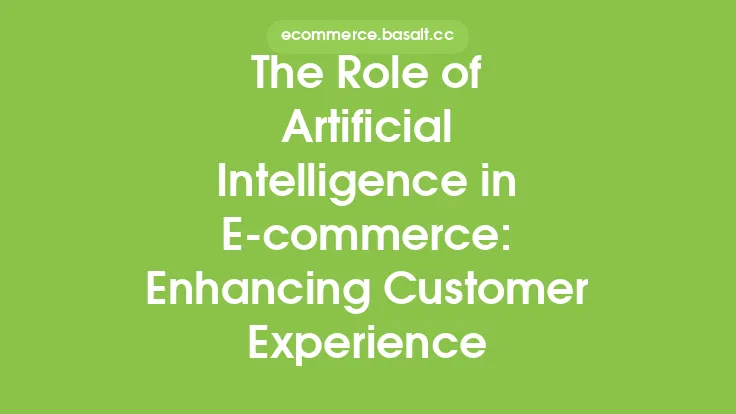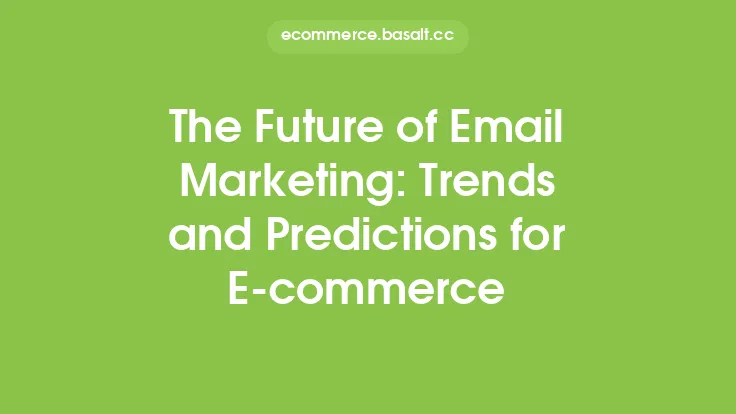In the realm of e-commerce, personalization and recommendations have become essential components for businesses seeking to enhance customer experience, increase engagement, and ultimately drive sales. At the heart of these strategies lies analytics, the process of analyzing data to gain insights and make informed decisions. The role of analytics in e-commerce personalization and recommendations is multifaceted, serving as the foundation upon which tailored experiences are built for customers.
Introduction to E-commerce Personalization
E-commerce personalization involves tailoring the online shopping experience to meet the individual preferences and behaviors of each customer. This can range from displaying products that are likely to interest them, offering personalized promotions, to customizing the layout and content of the website based on their browsing history and purchase behavior. Personalization aims to create a unique experience for each customer, making their interaction with the e-commerce platform more relevant and engaging.
The Role of Analytics in Personalization
Analytics plays a crucial role in personalization by providing the data and insights necessary to understand customer behavior, preferences, and patterns. Through analytics, e-commerce businesses can collect and analyze vast amounts of customer data, including browsing history, search queries, purchase history, and demographic information. This data is then used to create detailed customer profiles, which serve as the basis for personalization strategies. Analytics tools can help in segmenting customers based on their behavior, predicting future purchases, and identifying trends that can inform product recommendations and content customization.
Recommendations in E-commerce
Recommendations are a key aspect of e-commerce personalization, where products are suggested to customers based on their past purchases, browsing history, or search queries. The goal of recommendations is to present customers with products they are likely to be interested in, thereby increasing the chances of a sale. Analytics is instrumental in powering recommendation engines, which use algorithms to analyze customer data and behavior to suggest relevant products. These algorithms can be based on collaborative filtering (recommending products based on the behavior of similar customers), content-based filtering (recommending products with similar attributes), or hybrid models that combine multiple approaches.
Types of Analytics Used in Personalization and Recommendations
Several types of analytics are used in personalization and recommendations, including descriptive analytics, predictive analytics, and prescriptive analytics. Descriptive analytics focuses on historical data to understand what has happened, providing insights into customer behavior and purchase patterns. Predictive analytics uses statistical models and machine learning algorithms to forecast what is likely to happen in the future, such as predicting the likelihood of a customer making a purchase. Prescriptive analytics goes a step further by providing recommendations on what actions to take to achieve a desired outcome, such as suggesting the best products to offer a customer based on their profile.
Implementing Analytics for Personalization and Recommendations
Implementing analytics for personalization and recommendations involves several steps, including data collection, data analysis, and the integration of insights into the e-commerce platform. Businesses must first ensure they have the capability to collect and store customer data from various sources, including website interactions, social media, and customer feedback. This data is then analyzed using analytics tools and techniques to gain insights into customer behavior and preferences. Finally, these insights are used to inform personalization and recommendation strategies, which are integrated into the e-commerce platform to enhance the customer experience.
Challenges and Considerations
While analytics offers immense potential for personalization and recommendations in e-commerce, there are also challenges and considerations that businesses must address. One of the primary concerns is data privacy, as customers are increasingly sensitive about how their data is collected and used. Businesses must ensure they are transparent about their data practices and comply with relevant regulations, such as GDPR and CCPA. Additionally, the quality and accuracy of data are critical, as poor data quality can lead to ineffective personalization strategies. Businesses must also balance personalization with the risk of over-personalization, which can sometimes feel intrusive or spammy to customers.
Future of Analytics in E-commerce Personalization
The future of analytics in e-commerce personalization and recommendations is exciting and rapidly evolving. Advances in machine learning and artificial intelligence are enabling more sophisticated and real-time personalization capabilities. The integration of emerging technologies, such as augmented reality and voice commerce, is also expected to play a significant role in shaping the future of e-commerce personalization. Furthermore, the increasing use of mobile devices and social media platforms is providing new channels for personalization and recommendations, offering businesses more opportunities to engage with customers and enhance their shopping experience.
Conclusion
In conclusion, analytics is a vital component of e-commerce personalization and recommendations, providing the insights and data necessary to create tailored experiences for customers. By leveraging analytics, businesses can enhance customer engagement, increase sales, and build loyalty. As the e-commerce landscape continues to evolve, the role of analytics in personalization and recommendations will only continue to grow, driven by advances in technology and the increasing demand for personalized shopping experiences. Businesses that invest in analytics and personalization strategies are well-positioned to thrive in the competitive e-commerce market, offering their customers unique and compelling experiences that set them apart from the competition.





